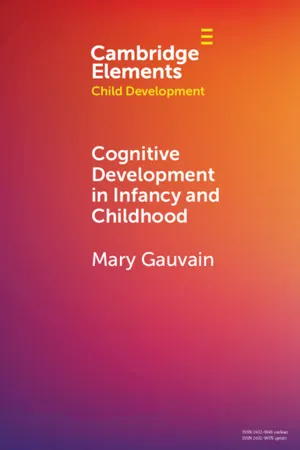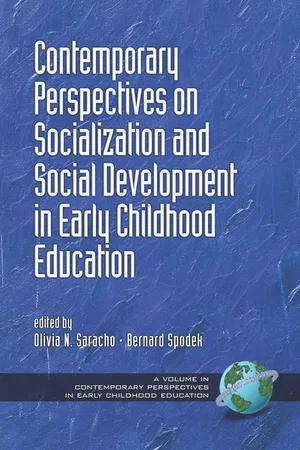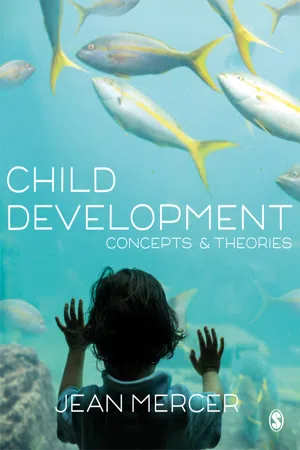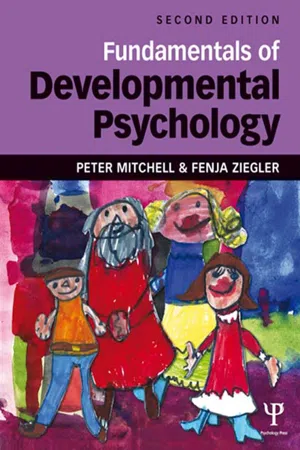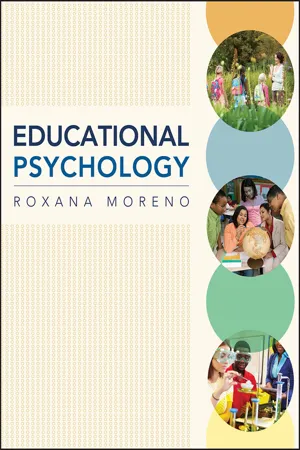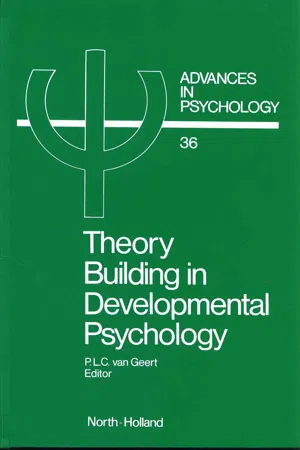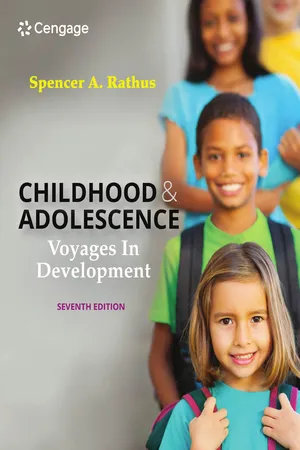Psychology
Cognition and Development
Cognition and development refer to the mental processes and growth that occur as individuals acquire knowledge, solve problems, and understand their environment. This area of study explores how cognitive abilities, such as attention, memory, language, and reasoning, evolve from infancy through adulthood. It also investigates the impact of social, cultural, and environmental factors on cognitive development.
Written by Perlego with AI-assistance
Related key terms
1 of 5
11 Key excerpts on "Cognition and Development"
- Mary Gauvain(Author)
- 2022(Publication Date)
- Cambridge University Press(Publisher)
Studies of what develops focus on changes over time in mental capacities, knowledge, and skills. This Element describes the develop- ment in a wide range of aspects of cognition: attention, language, social cogni- tion, memory, metacognition and executive function, and problem-solving and reasoning. Cognitive development is simultaneously universal and context-specific. Some cognitive changes are common to all human beings, and others vary within individuals and between groups or populations. This arrangement reflects a hallmark of human cognition – flexibility. People use their mental capabilities to deal with the problems of daily life. Culture, the natural eco- logical setting or habitat of human beings, plays a significant role by providing support and direction for cognitive development. 2 Cognitive Development: Coming to Understand and Act in the World The world is a complicated place. It is full of objects, some natural and others human-made. It is also full of people and activities. How do children make 1 Cognitive Development in Infancy and Childhood sense of it all, learn what the world has to offer, and then use this knowledge in productive and satisfying ways? This task, which is already huge, is further complicated because, while children are learning about the world, they are developing in many other ways. They are maturing physically, establishing relationships with the people in their lives, and acquiring and honing a large number of skills that allow them to participate in the activities around them. Cognitive development is one part of the biological, psychological, and social changes that make up human development. These changes are coordin- ated with and inform one another over time. They also have contingency relations; changes in one area may enable or facilitate changes in another area. For instance, what children perceive and the objects they explore contrib- ute to cognitive development.- eBook - PDF
- Olivia Saracho, Bernard Spodek(Authors)
- 2015(Publication Date)
- Information Age Publishing(Publisher)
79 Contemporary Perspectives on Socialization and Social Development . . . , pages 79–97 Copyright © 2007 by Information Age Publishing All rights of reproduction in any form reserved. COGNITIVE DEVELOPMENT IN SOCIAL CONTEXT Implications for Early Childhood Education Mary Gauvain Human beings are born with an extraordinary ability to learn. This ability is fundamental to the dramatic changes in children’s understanding of and engagement with the world during infancy and childhood. Research on cognitive development seeks to describe these changes and much of this research has focused on how children think or solve problems on their own. Although this research has provided extensive information about age-related cognitive abilities, it has provided less insight into two other impor-tant and related aspects of cognitive development: how cognitive change occurs and how children think when they are with other people. Children spend much of their time playing and working alongside other people. These experiences provide children with many and varied oppor-tunities for learning that affect the nature and course of cognitive develop-ment. The social world provides children with knowledge about the world along with direction and support in the development of skills that are used to guide intelligent action. In other words, cognitive development is socially constituted, both in terms of what children think about and how children learn to use cognitive abilities to carry out goal-directed actions. CHAPTER 5 80 M. GAUVAIN This chapter discusses cognitive development as an emergent property of social experience. It begins with discussion of the social foundations of human learning from the vantage of evolutionary psychology. The chapter then turns to a theoretical perspective, the sociocultural approach, which considers cognitive development as a social process. - eBook - ePub
Child Development
Concepts and Theories
- Jean A. Mercer(Author)
- 2018(Publication Date)
- SAGE Publications Ltd(Publisher)
Chapter 5 Concepts Related to the Development of Cognition and PerceptionChapter 5 is concerned with concepts that contribute to our understanding of children’s development of thinking, memory, and other cognitive processes. Theory plays an important role in the study of cognitive development, with valuable concepts having been contributed by the Swiss theorist Jean Piaget, by behaviourist thinkers, by dynamic systems theorists, and by others. Research methods specific to the study of cognitive development have been created. As these have shown, memory, thinking skills, communication, and language use all typically change developmentally from birth to age 12, following predictable developmental trajectories. Atypical cognitive development may interfere more or less severely with other aspects of children’s development.Introduction
The concept of cognition is a broad one that includes a range of mental and intellectual states and processes, including learning, memory, problem-solving, and symbol use. Cognition also includes the idea of concept use and formation that is the focus of this book. The extent of developmental change in cognition during childhood is evident when we think about the limited capacities of a 1-year-old and compare them to the much more advanced, almost adult-like, cognitive skills of a 12-year-old. Perception is a concept less frequently used in everyday thinking about child development; it may be thought of as involving processes that combine the sensory abilities discussed in Chapter 4 with cognitive advances, allowing the individual to make sense of the complex sensory world.Development story 5.1Five-year-old Oliver’s teacher, Ms McDonald, felt that he was ‘different’ soon after she met him. She noticed that he did not play much with other children at breaks, and did not even watch them as though he were interested but too shy to make friends. He seemed to be focused on his own concerns and would watch beetles or worms carefully. He did not seem unhappy and would answer briefly if asked a question. However, when frustrated Oliver would have a screaming tantrum, and Ms McDonald could usually not even understand what had frustrated him. Ms McDonald arranged a meeting with Oliver’s parents in the hope that she could find out more about him and understand what he needed before he got much older. - Lorelle J. Burton, Drew Westen, Robin M. Kowalski(Authors)
- 2022(Publication Date)
- Wiley(Publisher)
At birth, an infant possesses many adaptive reflexes. Motor development follows a universal maturational sequence, although cross-cultural research indicates that the environment can affect the pace of development. By the end of adolescence, physical growth is virtually complete. With ageing comes a gradual decline in physical and sensory abilities with which people must cope psychologically. 15.4 Describe how perceptual and cognitive development occurs in infancy, childhood and adolescence. • For many years, psychologists underestimated the substantial abil- ities of infants. Researchers now know, for example, that babies are capable of intermodal understanding — the ability to associate sensations about an object from different senses and to match their own actions to behaviours they observe visually — in the earliest days of life. • Piaget proposed that children develop knowledge by inventing, or constructing, a reality out of their own experience. According to Piaget, people cognitively adapt to their environment through two interrelated processes. Assimilation means interpreting actions or events in terms of one’s present schemas; that is, fitting reality into one’s previous ways of thinking. Accommodation involves modifying schemas to fit reality. • Piaget proposed a stage theory of cognitive development. Dur- ing the sensorimotor stage, thought primarily takes the form of perception and action. Gradually, children acquire object permanence, recognising that objects exist in time and space inde- pendent of their actions on or observation of them. Sensorimotor children are extremely egocentric, or thoroughly embedded in their own point of view. The preoperational stage is characterised by the emergence of symbolic thought. Operations are mental actions the individual can use to manipulate, transform and return an object of knowledge to its original state.- eBook - ePub
- Peter Mitchell, Fenja Ziegler(Authors)
- 2013(Publication Date)
- Psychology Press(Publisher)
3 DOI: 10.4324/9780203736357-3Contents
Introduction Stages of cognitive development Piaget’s explanation of cognitive development Traditional learning theory as a contrasting explanation of development A supplement to Piaget’s theory: Self-centered adolescents SummaryThe development of thinking 3
Chapter Aims- To introduce Piaget’s theory of cognitive development. To detail Piaget’s stages.
- To detail the evidence that lends support to Piaget’s stage theory.
- To present the mechanism that Piaget posited as responsible for cognitive development.
Introduction
The discipline concerned with studying the development of thinking is cognitive developmental psychology. The word “cognitive” refers to knowledge, but not necessarily according to the common meaning of the word. When people talk about knowledge, they usually mean the kind of information useful for answering questions in games such as The Weakest Link or Who Wants to be a Millionaire, or in order to do college exams. In contrast, cognitive developmentalists think of knowledge as referring to understanding about things.You might have noticed a child aged around 5 years speaking on the telephone about things only he can see: He seems to overlook the fact that the person he is speaking to is in a completely different location and cannot see the same things. Perhaps this is a sign that the young child is incapable of putting himself in someone else’s shoes. In the broadest sense, it is tempting to suppose that the child does not understand that other people can have different perspectives. Cognitive developmentalists look at particular difficulties children have, such as poor communication ability, and then draw general conclusions about their underdeveloped knowledge of the world. An exciting aspect of cognitive developmental psychology concerns the things children say and do in various situations, and then speculating about the meaning of these in terms of what the child does or does not know about the world. - eBook - PDF
- Theodore Mischel(Author)
- 2013(Publication Date)
- Academic Press(Publisher)
That is how I understand Piaget's enterprise. These prefatory remarks therefore set the context for the discussion of Beilin's thoughtful and well- elaborated reconstruction and critique of Piaget's views on the develop- ment of physical concepts. At the same time, these remarks address them- 134 MARX W. WARTOFSKY selves right off to Beilin's conclusion that "it is not clear that the data of psychological research . . . have been of any significant use to philos- ophers" (p. 117). I have already suggested what the relation is between philosophy and developmental psychology—or more accurately, de- velopmental psychology in the context of genetic epistemology. Put this way, Beilin's question about the testability of the claim that under- standing the nature of mind "is the same" as understanding how it develops (p. 117) almost answers itself. Developmental psychology is the applied, experimental inquiry into the conditions and typical struc- tures and sequences of cognitive growth; it is, in effect, applied or ex- perimental epistemology, as distinct from the related scientific enterprise, analytic epistemology. Its theoretical context is genetic—that is, it is epistemology viewed in the contexts of the origins of knowledge, and of the evolution or growth of knowledge; further, it is essentially a na- turalistic epistemology with a strong instrumentalist bias, in that the at- tainment of knowledge is seen as an adaptive utility in normal maturation of the individual, and in the history of cognitive development of the species. The origins of our concepts and theories in action, in the praxis necessary for human life, and the redirection of our concepts and theories to the rationalization of praxis, both attest to the functional character of theory in the life of the species. In such a context, philosophy and developmental psychology can hardly be seen as exclusive, but are rather different em- phases within the same enterprise. - eBook - PDF
- Roxana Moreno(Author)
- 2011(Publication Date)
- Wiley(Publisher)
Can students’ cultural backgrounds affect the ways in which they think? 3. Does having a second language interfere with the development of English skills? ASSESS YOUR PRIOR KNOWLEDGE AND BELIEFS Journal Activity What Is Human Development? •••••••••••••••••• 73 C Some developmental changes occur naturally, as a consequence of our genetic pro- gramming, and are therefore called maturation changes. Maturation happens over time and is relatively unaffected by the environment. Most of human physical development falls in this category. Other changes, such as social development, do not occur unless a person is able to interact with the environment and other people. You will soon learn that cognitive and language development are affected by both— maturation processes and the interaction with the physical and social environments. These two development forces are commonly called the nature and nurture factors in human development, respectively. You may recall that in Chapter 2 we discussed whether the gender differences found in education originate in biological/nature dif- ferences (such as those stemming from different brain structures and/or hormones) or social/nurture influences (such as the different expectations that are set for females and males in our society). A similar discussion applies to human development: exactly how much nature and nurture contribute to development is still under debate. Let’s examine the role of nature in human cognitive development—the human brain. The Human Brain and Cognitive Development Although the relationship between mind and brain is still not totally understood, cur- rent research suggests that the workings of the mind are associated with the structure of the brain, an idea that is called specialization. - Michele Hoffnung, Robert J. Hoffnung, Kelvin L. Seifert, Abi Brooker, Sonja Ellis, Damien Riggs, Wayne Warburton, Elyse Warner(Authors)
- 2022(Publication Date)
- Wiley(Publisher)
Cognitive theory will also help explain the development of symbolic thought and language among preschoolers (discussed in the chapter on psychosocial development in early childhood) and how growth in thinking and problem-solving abilities affects relationships with peers in middle childhood (discussed in the chapter on psychosocial development in middle childhood). In the chapter on cognitive development in adolescence, we will see how cognitive theory is used to design programs to foster critical thinking among adolescents; to better understand adolescent egocentrism, imaginary audience and personal fable; and to understand moral development and the ethics of care during adolescence. Cognitive developmental theories have been increasingly helpful in explaining intellectual functioning during early, middle and later adulthood. They have also been used to explore the question of whether cognitive development culminates in formal operational thinking, Piaget’s fourth and final stage, which captures the ability to define problems in new and often contradictory ways that develop during the adult years. Pdf_Folio:59 CHAPTER 2 Theories of development 59 Schaie’s (1994, 1996; Schaie & O’Hanlon, 2013; Willis & Schaie, 2009) contextual theory suggests that at different periods of adulthood adults use their knowledge in different ways that depend on their changing patterns of commitments to work, family and community life. Additionally, during middle adulthood, crystallised intelligence (which includes learned cognitive processes and abilities such as vocabulary, general information and word fluency) improves with age, while fluid intelligence (the ability to process new information in novel situations) peaks during adolescence and decreases with age.- eBook - PDF
- P. van Geert(Author)
- 1986(Publication Date)
- North Holland(Publisher)
Experience is defined in terms of 1) memory traces, 2) the whole of cognitive, affective and functional content of the temporal bonds in the nervous system, 3) functional changes in different subsystems of an organism. Thus it is of enactive character. The whole of an individual's experience consists of species experience, individual experience sensu stricto, and social experience acquired during the processes of socialization and enculturation. The basic unit of human experience has cognitive, affective and evaluative aspects. The structuring of experience takes place in the processes of programming activity, in the formation of habits, cognitive structures of personality, etc. An important role in the processes of structuring experience is played by cultural patterns of behaviour, language and other systems of signs and symbols in a culture. Developmental psychology is increasingly becoming a distinct science dealing with the processes and regularities of psychic changes which occur during the whole life cycle of an individual. This broadens the field of the discipline, in which basic questions about what the psychic development of an individual consists of and how (i.e. according to which principles) it occurs are adressed anew. A new formulation of the subject of research makes it impossible to maintain the position of all the theories of psychic development that view it as the growth of psyche as a component and a function of the processes of biological growth and development of an organism. 332 M. Tyszkowa Assuming that the psychic development of man takes place in all periods of ontogenesis and is not completed with his biological maturity, one cannot avoid contradictions while supporting those conceptions of psychic development according to which it occurs only in the period of childhood and adolescence. - eBook - PDF
- Ronald Comer, Elizabeth Gould, Adrian Furnham(Authors)
- 2014(Publication Date)
- Wiley(Publisher)
Still other critics have charged that Piaget ’s theory fails to account fully for social factors, the influences that other people may have on a child ’s cognitive development (Carpendale & Lewis, 2010; Freund & Lamb, 2010). Piaget ’s theory, instead, focuses on how children guide their own development through experimentation and reflection. Later in his life, Piaget himself also wondered whether his theory said enough about the role of social experiences in development (Inhelder & Piaget, 1979; Piaget, 1972). As we will see, a contemporary of Piaget ’s had more to say about social influences on cognitive development. FIGURE 3.4 Theory of mind. Participants with a theory of mind recognize that the child in the story will look for the leftover chocolate in the blue cupboard, because the child is not aware of the mother’s switch of locations. theory of mind a recognition that other people base their behaviours on their own perspectives, not on information that is unavailable to them. CHAPTER 3 BIOLOGICAL AND COGNITIVE DEVELOPMENT 64 Adolescence LEARNING OBJECTIVE 6 Summarize the major physical, cognitive and emotional changes that take place during adolescence. With the possible exception of the first couple of years of life, the amount of change that occurs during adolescence rivals that of any other developmental passage. Most crucially, puberty begins. In the cognitive sphere, adolescents dis- play features of both children and adults, and they begin to learn how to function independently. In this section, we will describe some key biological, cognitive and social transitions that characterize this dramatic period. Physical Development Pubert y refers to the physical devel- opment of primary and secondary sex characteristics (Herdt, 2010). Primary sex characteristics are the body struc- tures that have to do specifically with the reproductive system, including growth of the testes and the ovaries. - eBook - PDF
Childhood and Adolescence
Voyages in Development
- Spencer Rathus(Author)
- 2021(Publication Date)
- Cengage Learning EMEA(Publisher)
Concrete operational 7–12 years Logical mental actions—called operations—begin. The child develops conservation concepts, can adopt the viewpoints of others, can classify objects in series, and shows comprehension of basic relational concepts (such as one object being larger or heavier than another). Formal operational 12 years and older Mature, adult thought emerges. Thinking is characterized by deductive logic, consideration of various possibilities (mental trial and error), abstract thought, and the formation and testing of hypotheses. Jean Piaget’s Stages of Cognitive Development CONCEPT REVIEW 1.2 Information-Processing Theory Another face of the cognitive perspective is information processing (Calvete & Orue, 2012; Chen, 2018). Psychological thought has long been influenced by the status of the physical sciences of the day. For example, Freud’s psychoanalytic theory was related to the 19th-century development of the steam engine—which can explode when too much steam builds up. Many of today’s cognitive psychologists are influ- enced by computer science. Computers process information to solve problems. Information is encoded so that it can be accepted as input and then fed (“inputted”) into a computer. Then it is placed in working memory (RAM) while it is manipulated. The information can be stored more permanently on a storage device, such as a hard drive. Many psychologists speak of people as also having working or short-term Doug Goodman / Science Source Antonio Guillem/Shutterstock.com PART 1 WHAT IS CHILD DEVELOPMENT? 20 Copyright 2022 Cengage Learning. All Rights Reserved. May not be copied, scanned, or duplicated, in whole or in part. Due to electronic rights, some third party content may be suppressed from the eBook and/or eChapter(s). Editorial review has deemed that any suppressed content does not materially affect the overall learning experience.
Index pages curate the most relevant extracts from our library of academic textbooks. They’ve been created using an in-house natural language model (NLM), each adding context and meaning to key research topics.
